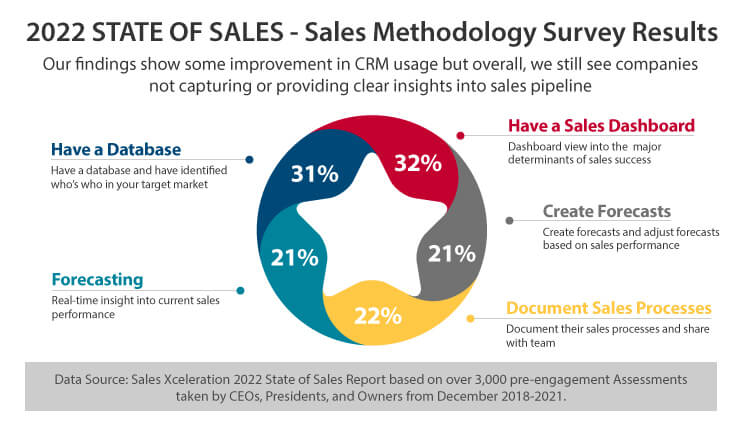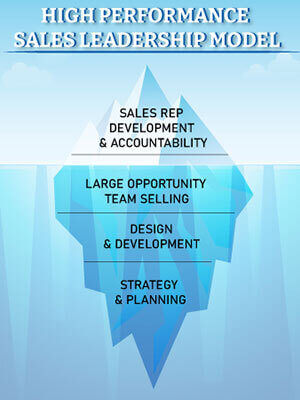
If you keep hearing that you need to upgrade your Customer Relationship Management (CRM) system to hit your sales goals, this article should help you avoid the staggering CRM failure rates abundantly published through the years.
Can a CRM Really Fix My Sales Team? The answer is simple… No.
CRM effectiveness remains a problem across all business sectors. As cited by Gartner in July-2022, “Too frequently, sales leaders purchase sales technology on faith, believing that just by installing the technology they will drive better outcomes. In reality, Gartner research shows that just 24% of companies believe that their sales technology implementation is optimized.”
So how does a sales organization know they are ready to deploy a CRM to ensure they can expect strong ROI from the investment?
There are several affordable and viable subscription-based CRM systems available today. The actual monthly cost and implementation fees are a small portion of the true investment. The bigger impact is the disruption to selling time and the notable distraction to the sales leader. Plus, the ongoing operating cost (time and money) to keep the system running smoothly should also be considered. The bottom line is this…
It’s revenue-critical to focus on new CRM implementations, or large-scale retrofits, in the right “order of things” to realize anticipated ROI.
Do I Really Need a CRM?… “Yes”
CRM is unquestionably a foundational layer in a businesses’ technology stack. Configured properly, it’s an essential piece of software when it comes to effectively managing your sales team. Without a way to capture and report on your sales team’s activity, it’s hard to hold your salespeople accountable and just as difficult to identify where they need help with skill gaps.

When a CRM is set up correctly with the right strategy driving it, the transparency and insight into the business is invaluable. This is immensely helpful to you as a sales leader because you have access to your team’s pipeline progress through insightful dashboards. Instead of digging into every deal to find out what is going on, you can set up executive level views that expose when it’s necessary to take that deep dive.
As shown below, our robust survey data aligns with Gartner’s recent article. CRM effectiveness and sales methodology in general are large opportunity areas for small and mid-sized businesses.

The software doesn’t make a sales process work. I have seen sales teams perform without ever using a CRM. It can’t improve the quality of a cold call, write an email that inspires action, prevent a deal from stalling, etc.
If your sales team isn’t hitting their numbers, a CRM likely isn’t the reason. It could play a part, but usually there are other foundational sales elements that need to be in order before a CRM can play its core role of enablement. Let’s look at those.
Establishing a Solid Sales Foundation Before CRM
Well Documented, Proven Sales Process:
Successful selling really comes down to having a clearly defined process and making sure you follow it consistently. Identifying what your sellers need to do may seem like common sense, but you would be surprised by some of the situations I have come across. As shown above in my 2022 State of Sales survey with over 3,000 businesses reporting, only 22% had what they’d describe as a well-documented sales process.
If you are consistently following up and closing deals by utilizing a desk full of post it notes and a rolodex filled with contacts, it’s hard to argue with success. Although soon you’ll find this is not a scalable model and it relies much too heavily on “the right” salesperson being able to operate successfully in that manner.
Making sure you have a well-documented sales process in place is the most important thing you can do to make sure your sales team is performing to their potential. Read this blog to learn more about creating a successful sales process.
An Accountable Sales Culture:
In order for salespeople to succeed in their roles, they need to be accountable for their efforts and results.

Your team needs to understand their success depends on their own actions. They must follow the steps you outline for them in a proven sales process and work to improve their results.
They need to understand their results are driven by the effort they put in.
When there is a wide range of success across a sales team, I usually investigate accountability levels. For example, a properly configured CRM will highlight a lack of follow-through on leads but that alone can’t fix the problem.
In this case I would say the more likely issue is the salespeople aren’t following the established lead generation process and they would prefer leadership not hold them accountable for those choices. Therefore, a fancy new software system won’t fix those kind of “people” issues.
Effective Sales Coaching with Consistent Meeting Rhythm:
For any team to be effective, they need to be coached. A sales leader needs to have consistent one-on-one meetings with their team members to ensure that both top performers and those who aren’t hitting their numbers are focusing on the fundamentals that lead to success.
Regular sales team meetings need to be designed to include high-impact group activities that focus on skill development. How are your current sales meetings going?
- Do you spend the whole time analyzing each deal to understand the complexities and challenges?
- Do you recognize skill growth in your sellers or are you selling through them?
A CRM is an incredible tool to address these questions. However, it is far from a cure-all when the root problem is that the sales leader doesn’t have the experience or skillset to effectively lead the sales team.

A dedicated sales manager is a great asset when the business plugs them into a solid sales platform.
The common misstep is underestimating the scope of skills needed to satisfy the entire sales leadership “iceberg” and expecting the sales manager to perform beyond their experience level.
Here’s reference to a blog I wrote on sales accountability that applies to your salespeople and their sales leader called, How Can I Build An accountable Sales Culture?.
Helping You Navigate “the order of things”
If your salespeople are advocating the implementation or retrofit of a CRM being the answer to fixing their sales problems, be careful not to fall into that trap. First, you must look at your fundamentals and shore them up to create a solid platform for sales achievement.
When the CRM is positioned properly as the enablement tool it is meant to be, it can make a powerful impact. The key is being wise to the order of things.
This can be a lot for an owner or sales leader to sort out, especially when they are in the thick of it.